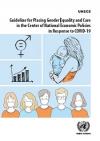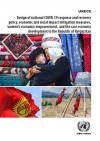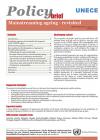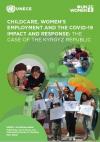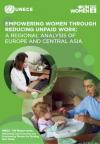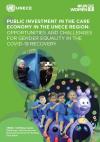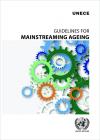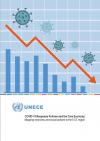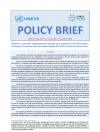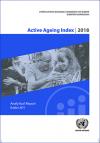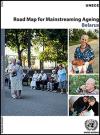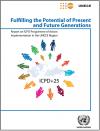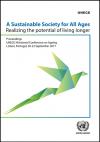Publications
Displaying Results 1 - 20 of 83
- English
The United Nations’ 1994 International Conference on Population and Development (ICPD) in Cairo set a bold new vision of the relationships between population, development and individual rights and well-being. It recognized that population was not about numbers, but about people, and that individual dignity and human rights are the basis for individual well-being and sustainable development.
Ahead
- English
UNECE Policy Brief on Ageing No. 28
At any age, intersecting factors such as poverty, disability, social isolation and exposure to abuse can increase the risk of vulnerability and weaken resilience in the case of adverse events. The COVID-19 pandemic, rising inflation, natural disasters, and war are examples of adverse events that have disproportionately affected vulnerable persons, including
- English
The 2022 UNECE Ministerial Conference on Ageing (Rome, Italy, 16-17 June 2022) concluded the fourth cycle of review and appraisal of the Madrid International Plan of Action on Ageing (MIPAA) and its Regional Implementation Strategy (RIS).
These proceedings provide a summary of the Conference deliberations, as well as a synthesis of the policy progress made between 2017 and 2022 to advance active
- English
To support national efforts toward developing and implementing care-responsive and gender-transformative response and recovery policies, the UN Economic Commission for Europe (ECE) has engaged in a global project with UN regional commissions and cooperating partners. The toolkit “Placing Gender Equality and Care in the Center of National Economic Policies in Response to COVID-19” has been
- English
This report contributes to the development of COVID-19 recovery efforts and economic and social strategy and priority actions in the Republic of Kyrgyzstan, based on the gender-sensitive approach and the strengthening of the care economy strategies in the post-pandemic recovery period. It represents an overview of the main policy areas of the development and implementation of public post-
- English
The Madrid International Plan of Action on Ageing (MIPAA), adopted at the Second World Assembly on Ageing in April 2002, set a comprehensive and bold agenda for ageing-related policies in the 21st century. With the UNECE Regional Implementation Strategy for MIPAA adopted in Berlin the same year, countries drew a roadmap for creating a society for all ages in the region.
This report, issued to
- English
The population of the UNECE region is ageing: one in four people will be 65 years old or above by 2050 compared to one in six today. Population ageing has social and economic implications for which societies need to prepare. This requires a coordinated, whole-of-government and whole-of-society effort to bring societies and economies into harmony with demographic change, otherwise known as ‘
- English
The report Childcare, Women’s Employment and the COVID-19 Impact and Response: The Case of the Kyrgyz Republic is part of the “UNECE - UN Women series: Rethinking care economy and empowering women for building back better”. This series includes key results of a collaboration between UNECE and UN Women Regional Office for Europe and Central Asia in the framework of the UN Development Account
- English
The report looks at the current situation of women’s labour force participation in Serbia, unemployment and activity rates, the gender pay gap and the linkages between women’s employment, childcare provision and family policies (including maternity and parental leave). It explores how childcare provision affects women’s labour market participation. The report examines the impacts of COVID-19
- English
The most recent in the series of Policy Briefs on Ageing is "Mainstreaming Ageing - Revisited"Unofficial translation (GER)
See all "
- English
The Report presents a thematic regional analysis of unpaid work of women in Eastern Europe and Central Asia (EECA) and the resulting empowerment women gain when their responsibility for such work is reduced. The report concludes with policy recommendations that prioritize the importance of unpaid work as a barrier to women’s economic empowerment. Removing this barrier require specific
- English
Opportunities and challenges for gender equality in the COVID-19 recovery
COVID-19 has highlighted the importance of investment in the care economy for successful response, recovery and “building back better” from the pandemic. The report provides evidence on UN Economic Commission for Europe (UNECE) member states´ efforts to secure and expand care-focused investment during the pandemic response
- English
Mainstreaming ageing is a policy strategy directed towards integrating ageing issues into all relevant policy fields on all levels, which helps to adapt to population ageing and ensure the integration of the needs of all ages groups, including older persons, into the policymaking process.
The Guidelines for Mainstreaming Ageing outline five stages that support countries in establishing a
- English
This document provides a mapping of policy initiatives in the ECE region. It identifies applications of best practices and innovative approaches which can be incorporated into individual country’s measures and initiatives. It is based on data from all ECE member states, compiled between July and September 2020, from available international or regional databases as well as national sources.
Also
- English
This policy brief is part of the United Nations Development Account tranche 13 project: Strengthening Social Protection for Pandemic Response, in particular its workstream on strengthening care policies with a gender lens with the participation of UN regional commissions and cooperating partners, including UN Women regional offices. It analyzes economic and social policies of ECE member states in
- English
The 2018 Active Ageing Index Analytical report jointly launched by UNECE and the European Commission shows that since 2008 most countries in the European Union have improved their overall AAI scores.Progress has been strongest for women. The report presents the latest AAI calculations and progress over time. The Active Ageing Index is a practical tool for policymakers that helps identify
- English
The Road Map for Belarus is the fourth in the Road Map for Mainstreaming Ageing series. It is the result of a close collaboration between UNECE and the Governement of Belarus and a comprehensive participatory process that took place in the country between
- English
Five years after the regional ICPD Beyond 2014 review process and the adoption of the 2013 Chair's summary, UNECE and UNFPA have collaborated to report on the achievements and challenges faced by member States in the implementation of the recommendations contained in that outcome document. This report highlights key population and development trends affecting the UNECE region since the
- English
This publication documents the third cycle review and appraisal of the implementation of the Madrid International Plan of Action and its Regional Implementation Strategy (MIPAA/RIS, 2002) in UNECE member States between 2012 and 2017. The regional review concluded with the 4th UNECE Ministerial Conference on Ageing held in Lisbon, Portugal, on 20-22 September 2017. The Ministerial Conference,
- English
This publication is the third UNECE's report on country-level projects entitled Road Maps for Mainstreaming Ageing, undertaken in UNECE member States at the request of their Governments.(Road Map - ECE-WG.1-22)



